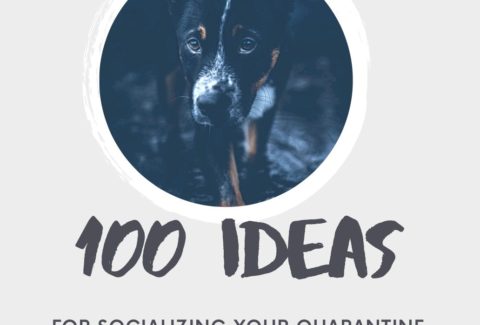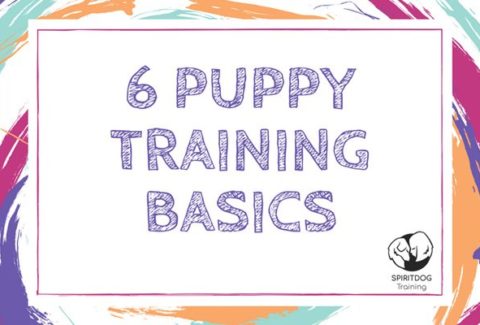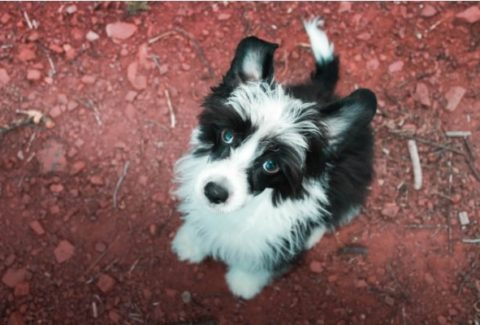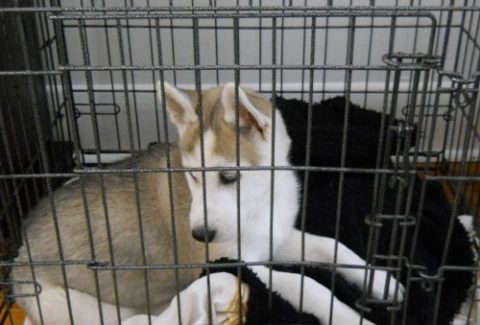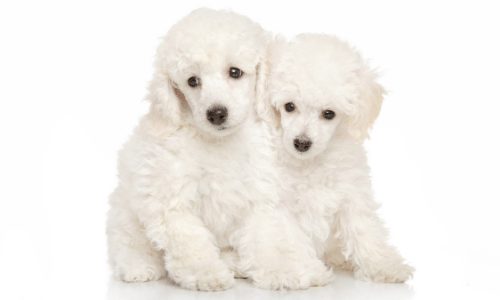How To Stop Puppy Biting – The Ultimate Guide
May 21, 2021 2021-06-27 13:27How To Stop Puppy Biting – The Ultimate Guide
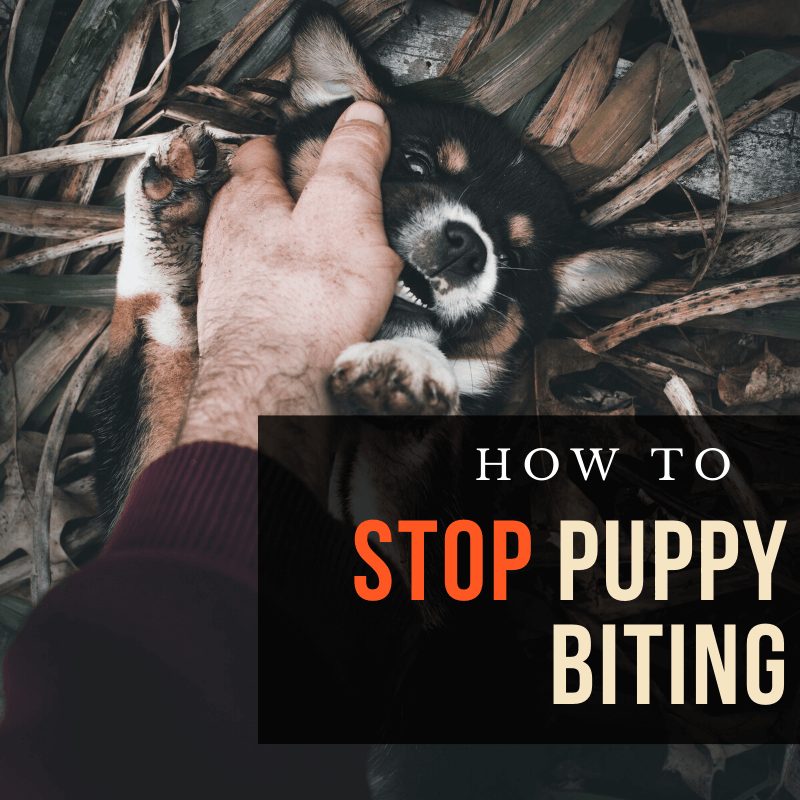 If you have ever had a puppy, you have probably been bitten at one point or another. Puppies like to explore the world with teeth, play with teeth, show you their displeasure with teeth and even asleep chewing on something. If they take their teeth towards you, it will be painful and frustrating and you want to know?
How can you stop my puppy from biting?
As a dog trainer, I get calls or emails every single day about puppy biting. It becomes a very frustrating issue for owners, and can in some cases severely impact the bonding process between owner and puppy.
If you have ever had a puppy, you have probably been bitten at one point or another. Puppies like to explore the world with teeth, play with teeth, show you their displeasure with teeth and even asleep chewing on something. If they take their teeth towards you, it will be painful and frustrating and you want to know?
How can you stop my puppy from biting?
As a dog trainer, I get calls or emails every single day about puppy biting. It becomes a very frustrating issue for owners, and can in some cases severely impact the bonding process between owner and puppy.
I have at times witnessed other dog trainers be pretty cavalier about this. “It’s a puppy, of course there’s gonna be some biting!” Well, yes – it is expected. But still, as trainers we need to recognize the potential resentment that comes from getting bitten (especially as a first time puppy owner) and use an approach that acknowledges the needs of both the puppy and his human.How can the owner start to feel connected to his new dog if the dog is doing is physically hurting him daily? I have encountered more owners than one would think who came to me in tears about their puppy’s mouthing habits. Let’s look at why puppies bite, and of course – how to fix it.
How Can I Stop My Puppy From Biting?
Every time we want to fix a behavior in our dogs, we look at where it originates. By being aware of why our dog acts the way he does, we can address the issue on hand much faster. Dogs do not have hands. The vast majority of the time, they will use their mouth to interact with the world around them. Want to move something? Use the mouth. Want to take something? Use the mouth. Want to play tug or fetch? You get it … they use the mouth.
On top of this comes that we actually bred many dogs to work with their mouth as well. Any retriever, any dog bred for protection work, any terrier will get inherent joy out of simply biting and holding items. This is the result of hundreds of years of clever selection and breeding: These dogs were made into workers with endurance and grit by genetically predisposing them to enjoy biting, holding, mouthing etc.
(Here you can read more about Working Dogs – Why You Might Not Really Want One)
No wonder our puppies are so insistent on biting, huh?
Dogs do not have hands. The vast majority of the time, they will use their mouth to interact with the world around them. Want to move something? Use the mouth. Want to take something? Use the mouth. Want to play tug or fetch? You get it … they use the mouth.
On top of this comes that we actually bred many dogs to work with their mouth as well. Any retriever, any dog bred for protection work, any terrier will get inherent joy out of simply biting and holding items. This is the result of hundreds of years of clever selection and breeding: These dogs were made into workers with endurance and grit by genetically predisposing them to enjoy biting, holding, mouthing etc.
(Here you can read more about Working Dogs – Why You Might Not Really Want One)
No wonder our puppies are so insistent on biting, huh?
Teething Puppies
As if this wasn’t enough biting already – like any young animal, puppies have unlimited curiosity and want to explore the world around them. They want to check out every little stick and leaf. They want to play. Puppies wrestle with their mouth, they claim resources for themselves with their mouth and they want to taste and chew – pretty much everything at some point during puppyhood (whether that is your rug, your couch or you arm). Oh. And did I mention that puppies are also teething and biting gives them relief from discomfort associated with that, as well as making it easier for the baby teeth to come out? To sum up … here is why your puppy (any puppy in the world really) is biting you: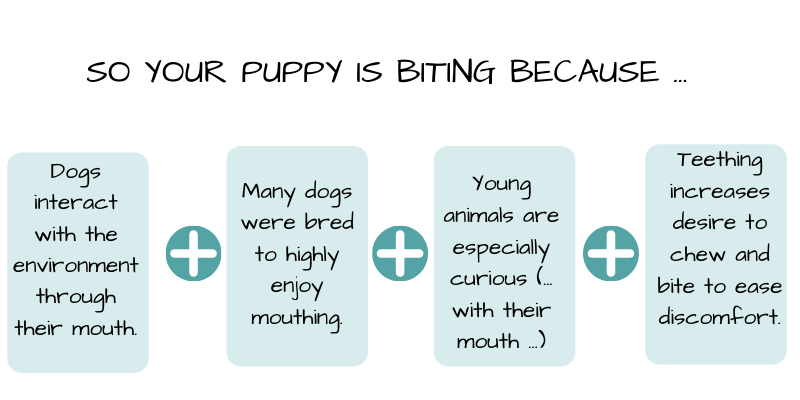
At What Age Does A Puppy Stop Biting?
Some trainers recommend to mostly ignore puppy biting, as ignored behavior will decrease over time. The reasoning is that the dog is lacking the reinforcement that comes through the owner’s reaction, and eventually “gets bored” of biting and mouthing – or simply grows out of it. While this is successful in some cases, it certainly does not always work like this.As we discussed above, our dogs are predisposed to engage with, and enjoy using their mouth – and they really do not always care whether we approve of it or not. The action alone is fun enough. They do not necessarily need our participation, just chewing away on our arms is plenty of entertainment for them. They are not “sad” or “bored” because we ignore it.Typically, especially for working-bred dogs the approach of completely ignoring biting (and hoping it will go away on its own) does not work. I have seen cases where dogs up to 1.5 or 2 years of age were still biting their owners like little puppies. This can lead to extreme frustration on the owner’s part, and impact the relationship between dog and handler dramatically. (Dogs for which ignoring biting does work are often dogs from the Toy Group – meaning dogs that were not bred to work with their mouth, but rather to “be cute” and provide companionship.) So, let’s look at how to actually stop the biting!
How Do I Get My 10 Week Old Puppy To Stop Biting?
So you just brought home a new puppy and he or she is biting you daily. How do you get your 8 or 10 week old puppy to stop biting? The vast majority of puppy biting is what I call “undirected mouthiness”. It means that there does not seem to be any structure or plan to the way the puppy is biting. It could be your pants or your arm and the next second it’s your fingers, he often lets go of one body part and goes directly over to the next, he is chewing and sometimes even looking a bit “zoned out” during the biting. Scolding or disciplining your puppy is not the answer. The puppy basically goes for what is near and convenient. He comes over to you specifically to mouth, or he starts it while you are petting him. Owners often describe this as “bites all the time”. This type of biting can be reduced drastically by providing your dog with an array of appropriate chew items.Why Does My Puppy Bite Me When I Pet Him?
You probably bought a lot of chew toys for your puppy already, and still he keeps biting you instead of his toys. Unfortunately, this is because you were somewhat tricked by the pet store. The majority of chew toys the pet industry sells as “chew toys” are actually anything but. Typical chew toys are rubber bones, little rubber tires, rope toys or plastic toys. There is no actual reason for your dog to enjoy chewing on this. It tastes like … well, rubber.You can envision your puppy’s daily desire to chew, bite, and generally gain reinforcement through his mouth like a mountain:
 Ideally, you want to wear this mountain down every day. Once your puppy has chewed his mountain of chewing desire away, he will not show any more undirected mouthiness.
(It is sort of an opposite Cup Theory – If Your Dog Doesn’t Listen – What Fills His Cup?)
Chewing on rubber/plastic/rope/stuffed toys often only does this to the mountain:
Ideally, you want to wear this mountain down every day. Once your puppy has chewed his mountain of chewing desire away, he will not show any more undirected mouthiness.
(It is sort of an opposite Cup Theory – If Your Dog Doesn’t Listen – What Fills His Cup?)
Chewing on rubber/plastic/rope/stuffed toys often only does this to the mountain:
 Most of that mountain is still there – and so is your puppy’s desire to mouth and chew your arms!
Most of that mountain is still there – and so is your puppy’s desire to mouth and chew your arms!
Because rubber does not taste good. Your puppy will chew it enough to take the very edge of his chewing desire – the tip of the iceberg – but not enough to wear down the entire mountain. He rather turns to something that actually takes good for that, such as your hands.
 Once your dog has “chewed out” his daily mouthiness mountain, he will no longer show the undirected mouthing. His desire to be active with his teeth has been fulfilled.
Once your dog has “chewed out” his daily mouthiness mountain, he will no longer show the undirected mouthing. His desire to be active with his teeth has been fulfilled.
Your Puppy’s Chewing Phase
Puppies do not understand this “desire to mouth” and how they can satisfy it. They just go and mouth whatever is closest (often their owner or a piece of furniture). You as the owner need to schedule chewing times every day and make sure your puppy has quiet and safe spaces and delicious chewing items. This means:- No older dogs around that might take away the chew items
- No kids should be allowed to make the puppy play during “chew time” or take his chews away
- There need to be plenty of different chew items for your pup to choose from
Puppies Biting During Play
Puppies that bite specifically during play have a different origin of biting. It is much more directed (towards things that move/are close to their toy) and usually once the puppy has “latched on”, he is more insistent on holding his bite than in “undirected mouthiness”. This type of biting stems from the inherent play/prey drive that all dogs have to a certain level. All play mimics some kind of hunting behavior. Whenever we play with toys, the toy is the prey and our dog is pretending to go through (and having fun with) some part of the predatory sequence. Like already with the chew items, the pet industry isn’t exactly helpful with appropriate puppy toys. Nearly all toys you can find in the toy aisle are:- Too hard
- Too short
- Not prey-like enough
The best toys for puppy play are not actually toys. An old and torn-up t-shirt will be a much more fun for your dog than a small and hard “actual toy” from the pet store.Just before the lockdown I had a local puppy consultation for a pup who would bite his owners’ hands every single time they played. I had them get out an old shirt and play with that (the shirt was bigger than the puppy!). For the first time ever, the pup showed appropriate play behavior – no biting hands, no attacking the human, but actually “fighting” with the shirt. It was not the puppy being “bad” at playing – it was just that he had bad toys beforehand!
How Do You Assert Dominance Over A Puppy?
You shouldn’t try to assert dominance over your puppy. He does not know that you don’t want him to bite you. If you treat him harshly, you will break his trust and set yourself up for potential reactivity issues down the road. A much better way to handle a puppy who is wild and wound up is to simply walk away. Put your puppy into a safe area such as an exercise pen and let him calm down. Puppies often become extra crazy when they are very tired, just like kids. When he has relaxed and taken a little nap, he will likely be easier to handle already.
How Do I Get My Puppy To Stop Biting My Hands And Feet?
Sometimes puppies become a bit (or very much) crazy and cannot think anymore. They are on a roll of adrenaline and games and even when offered appropriate toys might decide to keep on biting your hand, feet, sleeves etc. In such a scenario, it is an ok – and sometimes the best – solution to just end the game, get up and leave. You do not want your puppy to rehearse biting you in a play frenzy. It is usually clear when a puppy loses his mind during wild play and starts to just bite whatever he wants. Make your exit brief and swift, do not scold the puppy – but definitely interrupt the unwanted behavior and stop the play session.How To Discipline A Puppy For Biting
You should never discipline or punish your puppy for biting. In many cases the puppy will actually bite you back after a harsh correction, and then you really have a problem on your hands. This is a tricky one that you should really watch out for, as it can easily morph into a more serious communication problem between puppy and owner. A typical scenario would be the puppy doing something and the owner wants to reprimand him, bends down, wags his finger in the puppy’s face, tells him “No!” in a stern voice and the pup reacts by biting the hand.This is not the puppy “talking back” or “wanting to be alpha” – it is the puppy drawing a line and setting a boundary of what makes him feel uncomfortable.The scolded puppy most likely has no idea what he is getting scolded for. All he knows is that someone is bending over him in a threatening manner, intruding his personal space and maybe even raising their voice. Of course he is going to let that person know he does not think this is ok!
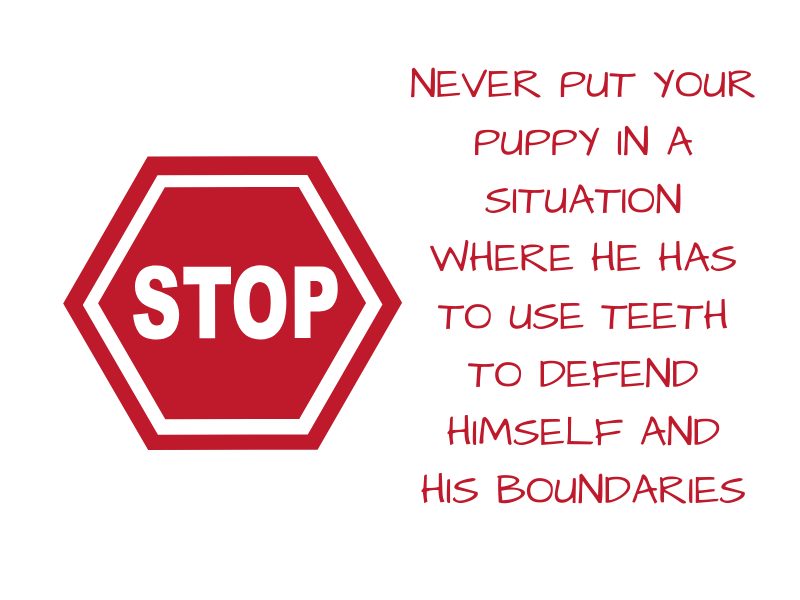 You should never put your puppy in such a situation. There is really no behavior that needs to be “reprimanded”. Puppies learn through management (controlling their access to the environment – such as for example not letting them roam the whole house during potty training), reinforcing good choices, setting them up for success and limiting the situations in which they can be “wrong” in the first place.
Putting you and your puppy in scenarios in which you scold him, and he tries to tell you (with his teeth no less!) that he feels really uncomfortable with that, is never good and needs to be avoided by all costs.
You should never put your puppy in such a situation. There is really no behavior that needs to be “reprimanded”. Puppies learn through management (controlling their access to the environment – such as for example not letting them roam the whole house during potty training), reinforcing good choices, setting them up for success and limiting the situations in which they can be “wrong” in the first place.
Putting you and your puppy in scenarios in which you scold him, and he tries to tell you (with his teeth no less!) that he feels really uncomfortable with that, is never good and needs to be avoided by all costs.
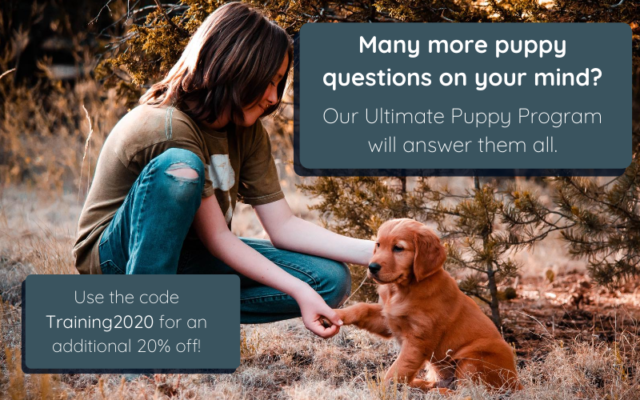
Hang In There!
It’s never fun to be bitten, mouthed and chewed on. The good news is that with proper management and the right reactions, your puppy will stop biting. And now have fun with your puppy, and enjoy watching him grow up. If you are raising a puppy during the COVID-19 shutdown, this article on Socializing Your Quarantine Puppy might also be useful. Happy Training!Steffi Trott
Steffi is the founder of SpiritDog Training.
Starting out just training her own Border Collies, she gradually expanded to local classes and seminars, now she travels as far as Europe and teaches students all over the world on how to train their dogs in a positive, bonding, game-based way.
She is known for her clear, step-by-step training that lets beginners and advanced dog trainers see lasting results very quickly.
Related Posts
How To Discipline A Puppy
May 19, 2021
100 Ideas For Socializing Your Quarantine Puppy
May 14, 2021
6 Puppy Training Basics
May 8, 2021
Growing Up A Spiritdog: 4 Months
May 7, 2021
Crate Training A Puppy: The Smart Way
February 15, 2021
Poodle Pregnancy
January 31, 2021
Check out our effective and affordable online dog training courses!
-
Sale Product on sale
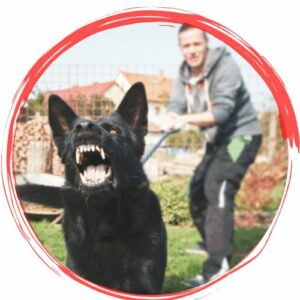 Tackling Reactivity Bundle
Tackling Reactivity Bundle
MONEY BACK GUARANTEE$564.00$49.00 -
Sale Product on sale
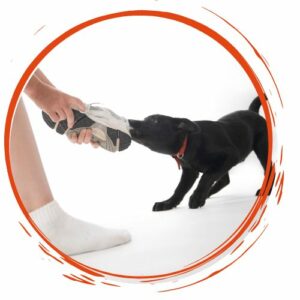 Perfect Obedience Bundle
Perfect Obedience Bundle
MONEY BACK GUARANTEE$349.00$49.00 -
Sale Product on sale
 Ultimate Puppy Bundle
Ultimate Puppy Bundle
MONEY BACK GUARANTEE$416.00$49.00 -
Sale Product on sale
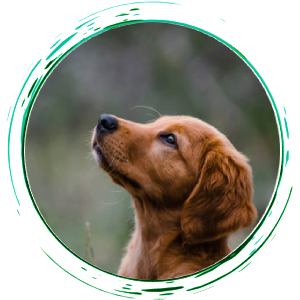 The Perfect Focus Bundle
The Perfect Focus Bundle
MONEY BACK GUARANTEE$445.00$169.00 -
Sale Product on sale
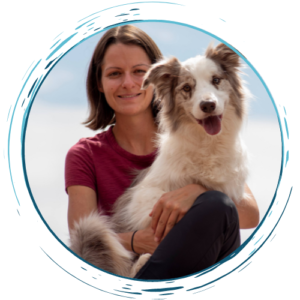 Ultimate Masterclass Bundle
Ultimate Masterclass Bundle
MONEY BACK GUARANTEE$2,213.00$499.00


